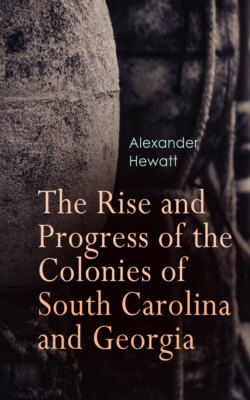The Rise and Progress of the Colonies of South Carolina and Georgia

Реклама. ООО «ЛитРес», ИНН: 7719571260.
Оглавление
Alexander Hewatt. The Rise and Progress of the Colonies of South Carolina and Georgia
The Rise and Progress of the Colonies of South Carolina and Georgia
Table of Contents
Volume 1
Table of Contents
PREFACE
CHAP. I
CHAP. II
CHAP. III
CHAP. IV
CHAP. V
CHAP. VI
Volume 2
Table of Contents
CHAP. VII
CHAP. VIII
CHAP. IX
CHAP. X
CHAP. XI
Отрывок из книги
Alexander Hewatt
Complete History (Vol. 1&2)
.....
From the great aera of the Reformation the English nation had been distracted with religious disputes, and divided into contending parties. One part of the people adhered to the old superstitious system of the Romish church, and strictly observed all the absurd tenets and practices of that establishment. Another party, of which the church of England was composed, seceded several steps from popery, but maintained the hierarchy in its full power and authority. The third sect were Puritans, who had imbibed such high notions of civil and religious liberty, as struck at the foundation of both hierarchy and monarchy. On all occasions they discovered a strong tendency towards a republican form of government and an irreconcileable aversion towards the whole fabric of the Episcopalian church. This party, during the two preceding reigns being chiefly composed of the dregs of the people, were regarded as of little consequence, and treated with supercilious contempt by the administration. But in the reign of King Charles the first they had amazingly increased, and many men of opulence and distinction had joined them, from motives of discontent or ambition, or from a passion for singularity and popular applause. When the religious disputes became warm in the nation, the zeal of this party broke out, and burned with such amazing ardour that it levelled all distinctions. To increase the confusion, Archbishop Laud insisted on conformity, and persecuted all who refused obedience to his mandates with the utmost rigour. But persecution, for the most part, proves destructive to the cause it is intended to promote. The miseries the Puritans endured, and their firmness and perseverance in the midst of sufferings, contributed to give them that merit and importance in the eyes of the nation, which otherwise perhaps they had never attained. Their sober and rigid manner of life, the plainness of dress which they affected, and the strong tendency they shewed towards religion in all their words and actions, had great weight with the vulgar and credulous part, and induced them to entertain high notions of their sanctity, and to venerate them as the peculiar people of God. Their number increased and became formidable. Many men of rank, disgusted at the measures of court, and apprehensive that the liberties of the nation were in danger, turned zealous republicans, and seemed to aim at a total subversion of the constitution, both in church and state. The King, though a well-wisher to religion, hated the principles of the Puritans, and considered them as dangerous and deceitful. Those enthusiasts, on the other hand, were determined to endure the severest persecutions, rather than admit the common prayer, organs, and surplices into their worship, and conform to the popish ceremony of kneeling at the sacrament. In short, the dispute about trifling ceremonies became serious on both sides, and augured no good to the nation. Dr. Laud, observing not only the laity but the clergy also infected with puritanical principles, deprived many of their livings, merely for not conforming to all the ceremonies of the church. During these troubles many fled to New England; and others caused houses to be built and lands cleared for them, with a view of retiring there, should their contention for religious freedom in England prove unsuccessful. In vain did Dr. Laud obtain an order of court to put a stop to emigration. There was not a corner of the globe to which these people would not flee, rather than conform to ceremonies which they thought savoured of popery and idolatry, and endangered their salvation.
To these disturbances New-England owed its population. Enthusiasm has often stimulated men to bold and arduous undertakings, and animated them to perseverance amidst great difficulties. Of this truth the first emigrants to New-England afford us a striking example. They seemed to bid defiance to the hardships to which they were exposed, having what they valued most of any thing in the world, I mean, liberty of conscience. Amidst cold, hunger, toil, disease, and distress of every kind, they comforted themselves with the thoughts of being removed far out of the reach of tyrants, and triumphed in their deliverance from an idolatrous and wicked nation. Neither the hideous gloom of the thick forest, nor the ravages and depredations of savage neighbours, appeared to them so grievous and intolerable as conformity to the that of England, and an implicit obedience to civil authority.
.....